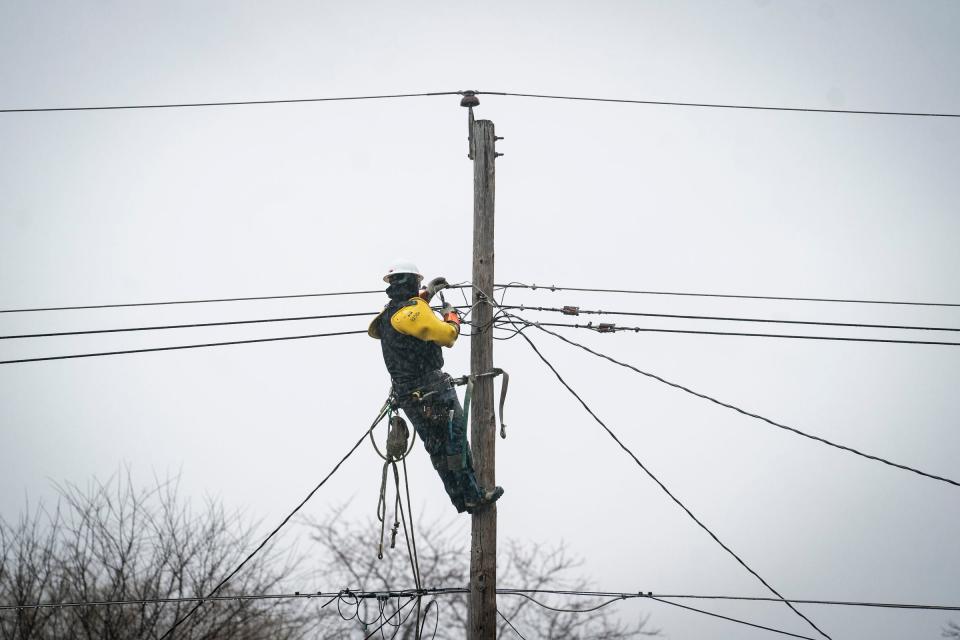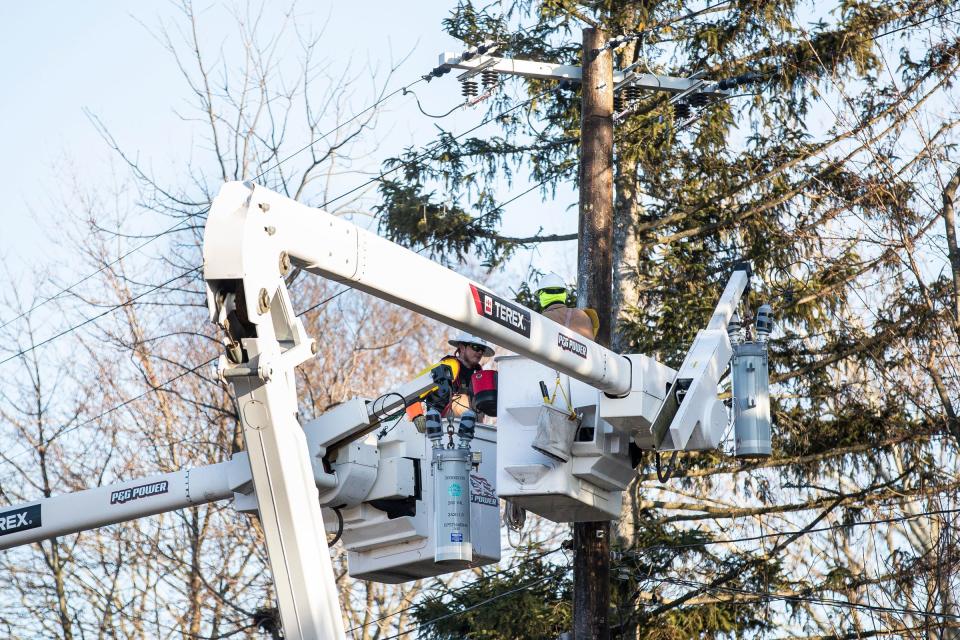Michigan lawmakers, residents grill DTE, Consumers over power outages from recent storms
Members of a House committee on Wednesday pressed executives from the state's two major electric utilities over the companies' response to outages from winter storms in recent weeks. The storms left hundreds of thousands without power, including some who went days without electricity during the frigid conditions.
Executives from DTE Energy and Consumers Energy, as well as officials from the Michigan Public Service Commission and residents affected by outages from ice and snow storms in late February and early March all testified before the Michigan House Committee on Energy, Communications and Technology. About 700,000 customers between the two providers lost power from a rare ice and freezing rain storm.
While lawmakers sought to identify problems and hold the companies accountable, utilities mounted a vigorous defense of their actions. But for everyday Michiganders, the utilities' words and required reimbursements for long-term outages didn't outweigh their experiences.
Cathleen Russ, of Royal Oak, a DTE residential customer, told the committee her power was out from Feb. 22 to Feb. 28 and again from March 3 to March 5. That meant she had to replace the food in her refrigerator and freezer twice, in addition to other inconveniences and expenses, Russ said. She could afford to take the hit, but many others can’t, she told the committee.
“To offer people in this situation $35 to offset their losses is at best insensitive and at worst unconscionable,” Russ said.
Michigan utilities are focused on revenues over service, lawmakers assert
“The consensus has been (place) people over profits for sure, I hope (you) are learning from that," said Committee Chair Rep. Helena Scott, D-Detroit.
Lawmakers questioned officials over their companies' handling of the outages, particularly how they responded to the needs of customers who lost power for consecutive days. Scott brought up the $35 outage credit DTE provided to customers who were without power for at least 96 hours, saying it likely wasn't enough to cover spoiled groceries and medicine that needed to be refrigerated.
DTE Electric President and Chief Operating Officer Trevor Lauer said he didn't think $35 could replace the lost items, but later noted the total amount of credits issued by DTE would cost the company $5.1 million.
The Michigan Public Service Commission (MPSC) is the state agency that regulates utility companies. Under MPSC rules, residents can receive a minimum $25 monthly credit toward their bill for lengthy or frequent outages. DTE offers $35, while Consumers offers $25. Current rules don't mandate utilities issue the credits automatically, although both Consumers and DTE have done so for the most recent outages.
State Rep. Mike McFall, D-Hazel Park, asked Tonya Berry of Consumers why the company only offered the minimum credit required instead of a greater number, noting that it would be a boost for the company's public relations at the bare minimum.

Berry, who is senior vice president of transformation and engineering at Consumers, said the company is open to discussions on increasing the minimum outage credit. The MSPC last March approved submitting a rule change to increase the minimum credit to $35, plus $35 per additional day of outage.
State Rep. Sharon MacDonnell, D-Troy, cited a recent Bridge Michigan report that DTE cut some areas of its budget to meet shareholder expectations in 2022. MacDonnell said the budget maneuver "doesn’t seem like capitalism to me."
"How can we have confidence in a company that seems to prioritize shareholders over its own customers?" she asked.
Lauer said the company does not place its investors ahead of services, and said the cuts didn't affect DTE's energy services at all — they were made in areas like lawn maintenance at substations and not hiring college students to conduct surveys over the summer.
“The success of our company is measured by our ability to offer reliable service to our customers," Lauer said.
State Rep. Jaime Greene, R-Richmond, asked Berry whether Consumers waives standard monthly charges for residents who lose power in outages. Berry did not directly answer Greene's query, but noted the company is providing a total of $15 million in bill credits to customers as part of its most recent rate increase approved by the MPSC. In January, the MPSC approved a $155 million rate increase for the company. Those credits will take effect on monthly energy bills for Consumers customers this year.
"I think what you're seeing is we really have to talk about the solutions of the future," Berry said. "Today, we are operating under the current standards and rules that have been set.
"We'll have to look at that in the future."
More:New Michigan GOP Chair Kristina Karamo rejects building, accepts party data
More:Michigan Senate Democrats pass bills repealing right-to-work law
Utilities stress Michigan's electric grid needs to be modernized
Company officials expressed regret over the outages — but stressed the energy providers were taking steps to modernize and "harden" Michigan's electrical grid to prevent future long-term outages during adverse weather events.
DTE's plan, Lauer said, contains four main tenets: continuing to invest in tree-trimming throughout its coverage area, performing preventive maintenance on its electric poles and transformers, rebuilding outdated infrastructure and automating its electrical system where it can.
“This is not the experience we’d want for anyone. We have a plan, we need to continue to invest in that plan,” Lauer said.
In rate increase requests submitted to the MPSC, DTE officials frequently cite improving service reliability as a factor behind asking to charge customers a higher rate. DTE is currently asking the MPSC to allow it to increase rates by $622 million "in order to recover, among other things, Applicant’s increased investments in plant involving generation, to support DTE’s carbon reduction plans and the State’s goals for cleaner energy, and the electric distribution system, to improve power reliability, as well as the associated depreciation and property tax increases."
Berry also mentioned steps Consumers is taking to harden its grid, such as "undergrounding" infrastructure, the practice of taking electrical equipment currently above ground and installing it below ground, in order to protect it from adverse weather and other factors. Consumers also trims trees to prevent outages, she added.

Tree trimming practice has worked, MPSC notes
"I want to be very clear, myself and my fellow commissioners ... find the current state of electric reliability in far too many areas of Michigan, to be unacceptable," said Katherine Peterick, an MSPC commissioner. She said utility reliability is "the No. 1 priority" for the board.
Peterick pointed to three reasons the electric grid in Michigan remains unreliable: the increasing effect of climate change leading to more extreme weather events; poor vegetation management, or tree trimming, in the past, and crumbling infrastructure, like poles, wires and transformers.
Increased tree trimming has improved reliability, data indicates. Outages were reduced by 74% on DTE's grid after tree trimming, Peterick said, adding that the length of those outages also decreased by 67%.
Lauer said in 2021 and 2022 alone, DTE has spent a combined $420 million on cutting down long branches which hang over and threaten electrical wires in the event of a storm.
Customers recall nightmarish experience with outages
For some residents, the most recent power outage brought forward brutal living conditions last month. As providers worked to restore power, some testified they went days without power.
For families dealing with remote work and education, losing power meant missing out on wages and learning, said Southfield resident Em Perry. Perry's home went 36 hours without electric service, she said.
She said her family was fortunate enough to find shelter at a friend's place, and considered herself "lucky" despite losing hundreds of dollars worth of groceries. Others had it much worse, Perry said.
Elouise Garley, a Detroit resident who emigrated from Liberia, said going days without power reminded her of conflict experienced in her home country.
“I got traumatized by violence. Whenever it’s dark, I think of my dark teenage days in Liberia," Garley said.
Highland Park Mayor Glenda McDonald said it felt as if DTE had overlooked the small community, which is surrounded by Detroit.
“We know that the infrastructure is outdated, and in this last outage, my fire department went down, my police department went down, city hall went down and two senior centers went down," McDonald said. “I cannot run a city, however small it is, without power. We just can’t do that.”
Lansing Bureau Chief Paul Egan contributed to this article.
Contact Arpan Lobo: alobo@freepress.com. Follow him on Twitter @arpanlobo.
This article originally appeared on Detroit Free Press: DTE, Consumers face questions over recent power outages in hearing

